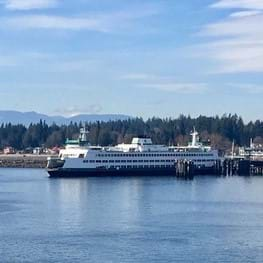
New funding secured for cleaner, greener WSF vessels
Washington State Ferries (WSF) is proceeding with the conversion of its three Jumbo Mark II class ferries (the largest in its fleet) from diesel to hybrid electric propulsion. In early October, the trustee administering the federal Volkswagen (VW) settlement across the United States approved up to $35 million to support retrofitting the first of the ferries.
Reducing diesel exhaust and carbon pollution from marine vessels is one of the priorities identified for Washington’s share of the VW settlement by the Washington Department of Ecology (a Green Marine supporter), which oversees investing the settlement funds. WSF is the largest consumer of diesel fuel in the State of Washington, using more than 18 million gallons (68 million litres) of diesel annually. Its three Jumbo Mark II ferries account for 26% of total fuel consumption. In September 2019, WSF selected Siemens to complete the propulsion system upgrade design for these vessels. Conversion design and planning will continue through 2020 with construction set to begin in 2021.
In addition to operational savings and lower maintenance costs, the Jumbo Mark II conversions will reduce carbon dioxide emissions by 48,565 metric tons yearly, which equates to taking more than 10,000 cars off the road. Hybrid ferries will also cut the emissions of nitrogen oxide by 184.5 metric tons per year once all three ferries are operating with hybrid electric propulsion. Constructed in the 1990s, the Jumbo Mark II class ferries are due for their mid-life propulsion system replacements, making for easy upgrades with minimal service disruptions. The ferries carry 202 cars and 1,800 passengers each and primarily operate on the Seattle/Bainbridge and Edmonds/Kingston routes.